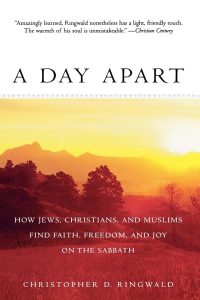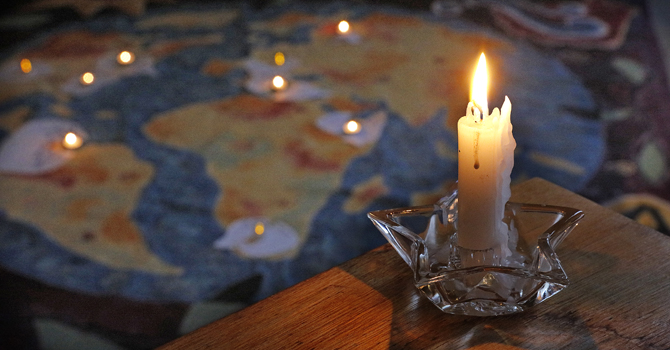
Receiving the Day: Christian Practices for Opening the Gift of Time
Receiving the Day invites us to open the gift of time, to dwell in the freedom to rest and worship that God intends for us and for all creatures.

“Sabbath keeping is not about taking a day off but about being recalled to our knowledge of and gratitude for God’s activity in creating the world, giving liberty to captives, and overcoming the powers of death.”
— Dorothy C. Bass
Thoughts and questions to help you consider this practice
Do you need a break, but doubt you have time for it? What about those who don't have sufficient work to sustain themselves? The practice of keeping Sabbath helps us to resist the tyranny of too much or too little work.
The Exodus commandment to "remember" the Sabbath (20:8-11) is grounded in the story of creation. Since we are created in God's image, what behavioral cues do we take from what we see of God in this story?
In Deuteronomy (5:12-15), the commandment to "observe" the Sabbath sees to it that no one, not even animals, will work without respite. How do people freed from slavery celebrate their liberation? What kinds of justice do they wish for others? How might Sabbath-keeping help us resist various forms of enslavement today, for ourselves and for others?
Shabbat — the Jewish Sabbath — is the heart of Judaism. In observant Jewish homes, Shabbat begins each Friday night at sundown as a woman lights the Sabbath candles. Until the following sundown, all activities associated with work or commerce are prohibited.
How does this Sabbath requirement of no work or commerce honor God and respect human needs? What are good re-creative activities to do on the Sabbath (e.g., worship, play, take a walk, rest, read, spend time with loved ones)?
In what ways did Jesus extend the meaning of Sabbath by his teaching and ministry? What did Jesus mean by proclaiming, "It is lawful to do good on the Sabbath" (Matthew 12:12)? When Constantine declared Christianity the state religion (321 C.E.), Sunday was established as the day for both rest and worship. Is Sunday the day of the week you experience Sabbath? If not, when do you and your household observe Sabbath?
Though we may yearn for Sabbath rest, what obstacles keep us from it? Pressures to work and spend? Organized sports? The fact that Sundays are no longer protected by custom and law? Trying to overcome a reputation of Sabbath-keeping as sapping joy from the day?
How might ceasing work one day a week reshape your work and attitudes on the other six? What is the advantage of a pattern of Sabbath time, as opposed to snatching odd moments or hours of Sabbath time? What are the advantages to keeping Sabbath on Sunday? Who might not be able to keep Sabbath on Sunday? How might we enable them to keep Sabbath another time?
How is Sabbath-keeping a way to honor the generosity of our Maker? How does our society's Sabbath-keeping (or lack thereof) express our relation to the created world? What changes in society would make it easier to keep Sabbath? In what ways can members of a worshiping community help one another step off the treadmill of work-and-spend and into the circle of glad gratitude for the gifts of God?
The Pharisees said to Jesus, "Look, why are your disciples doing what is not lawful on the sabbath?" Then he said to them, "The sabbath was made for humankind, and not humankind for the sabbath; so the Son of Man is lord even of the Sabbath."
— Mark 2:24, 27-28


"Remember that you were a slave in the land of Egypt, and that the LORD your God brought you out from there with a mighty hand and an outstretched arm; therefore the LORD your God commanded you to keep the Sabbath day."
— Deuteronomy 5:15
Sisters and brothers, alight here.
Cease your flying about for a moment.
Alight here and rest your movement, your wings, your daily things.
Alight here and sing, sing the praise of our Creator.
Moses, after years of wandering, finally alighted at the edge of the promised land, and met God.
God, the hovering, brooding Spirit is safely guarding this nest of worship.
Alight here, and call on the winged Spirit of God.
— Lani Wright, Cottage Grove, Oregon


"Praise with elation, praise every morning,
God's re-creation of the new day."
Text: Eleanor Farjeon
"O day of rest and gladness, O day of joy and light..."
Text: Christopher Wordsworth
"Teach me the measure of my days, thou Maker of my frame.
I would survey life's narrow space, and learn how frail I am."
Text: Isaac Watts (based on Psalm 39)
"Day by day, dear Lord, three things I pray:
to see thee more clearly,
love thee more dearly,
follow thee more nearly, day by day."
Text: St. Richard of Chichester

Receiving the Day invites us to open the gift of time, to dwell in the freedom to rest and worship that God intends for us and for all creatures.

With collected insights from sabbath keepers of all ages and backgrounds, Sabbath Keeping offers a practical and hopeful guidebook that encourages all of us to slow down and enjoy our relationship with the God of the universe.

With wonderful stories, poems, and suggestions for practice, Muller teaches us how we can use this time of sacred rest to refresh our bodies and minds, restore our creativity, and regain our birthright of inner happiness.

Combining sound biblical theology and research into Jewish traditions with many practical suggestions, Keeping the Sabbath Wholly offers a healthy balance between head and heart: the book shows how theological insights can undergird daily life and practice, and it gives the reader both motivation and methods for enjoying a special holy day.

Elegant, passionate, and filled with the love of God’s creation, Abraham Joshua Heschel’s The Sabbath has been hailed as a classic of Jewish spirituality ever since its original publication — and has been read by thousands of people seeking meaning in modern life.

Phil Connors, a sarcastic weatherman, finds himself reliving February 2nd over and over again in Punxsutawney, PA — but he’s the only person who realizes it. A modern-day morality tale in the guise of a romantic comedy, this film explores different ways we might spend our time if we had all the time in the world.

Based on the true account of the British running team during the 1924 Olympic games in Paris. Eric Liddell, a Scottish missionary, is a sabbatarian who refuses to run any races on Sunday, the day he is scheduled for a preliminary heat in the 100 meter dash.

In a compelling blend of journalism, scholarship, and personal memoir, Christopher D. Ringwald examines the Sabbath from Creation to the present, weaving together the stories of three families, three religions, and three thousand years of history.



This companion study guide to “Receiving the Day” is by Dorothy C. Bass, Lani Wright, and Don C. Richter. It is posted here by permission of Dorothy C. Bass.
This is a companion study guide to the “Sabbath” issue of “Christian Reflection: A Series in Faith and Ethics.” (c) 2002 The Center for Christian Ethics at Baylor University. All rights reserved. Permission is granted to reproduce these materials for personal or group study.
The July 2002 issue of “Christian Reflection: A Series in Faith and Ethics” features a collection of essays on the topic of Sabbath-keeping, including an interview with Dorothy Bass on “Opening the Gift of Sabbath.” (c) 2002 The Center for Christian Ethics at Baylor University. All rights reserved. Permission is granted to reproduce these materials for personal or group study.
In these blog posts, Pastor Bill Gafkjen advocates “the case for biblical sabbaticals” as a time of rest and renewal for others as well as for oneself.